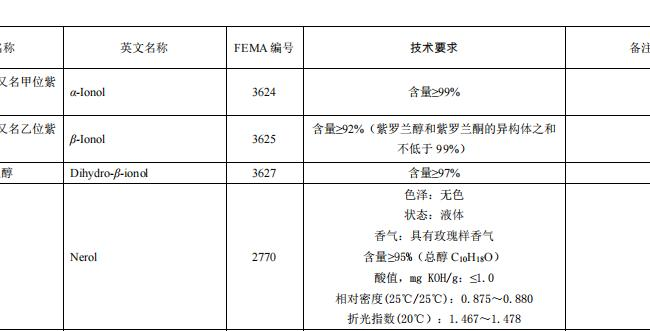The National Standard for Food Safety General Principles for Food Spices (GB 29938-2020) was established in 2022 for revision, and on November 8, the National Technical Committee for Standardization of Flavors, Fragrances and Cosmetics opened a public consultation on the draft revision of the standard, and the consultation was open until November 20, 2023 for comments. The revision is mainly for food synthetic flavors to modify the variety and quality specifications, in order to help you understand the standard changes in a timely manner, food partners combed through the standard opinion draft revision of the main content for your reference.
New synthetic flavor content other than
Quality Specification Requirements
This revision of Appendix D in some of the spice substances in addition to the content of quality specifications requirements, Appendix D name should be modified accordingly, from the “food synthetic flavor content requirements” to “food synthetic spice technical requirements”.
In view of the fact that the Joint Expert Committee on Food Additives (JECFA), the European Union Food Safety Authority (EFSA), the International Organization of the Food Flavor Industry (IOFI) and other organizations have detailed quality specifications for spices, and the current version of GB 29938 only specifies the content, this revision refers to the quality specifications of international standards, and combines with the data of the industry to increase the color, state, aroma of 17 spice substances, Refractive index, relative density and other technical indicators.
The 17 kinds of flavor substances are: 1-p-perylene-4-ol (also known as 1-p-menthol-4-ol), α-pinene, β-pinene, thujaplicin acetate, isobornyl acetate, neomethylhesperidin dihydrochalcone, phenylpropanal (also known as 3-phenylpropanal), nerolidol, geraniol, geranyl alcohol, isopinene, α-synephrosinone, nigrosinol, isovaleric acid, isoprenal. Tetrahydrocoumarol, γ-pentolactone, 2-acetylpyridine.Examples of new quality specification requirements in the GB 29938 opinion draft are shown in Figure 1.

Figure 1 Examples of new quality specification requirements in GB 29938 draft comments
New Approved Synthetic Spices and Quality Specification Requirements
At present, there are 12 kinds of spices that have been listed in GB 2760-2014 National Standard for Food Safety and Use of Food Additives but do not have quality specification requirements.
The draft adds three new flavors (l-rhamnose, SEF 7525 for hardwood smoked flavor, SmokEz C-10 for hardwood smoked flavor) and their quality specification requirements. The other nine spices (methyl geranylate, 3-acetoxyhexanoic acid methyl ester, 4-hepten-3-one, glycyrrhizic acid, pyromellitic acid extract, polymerization of Boehmeria nivea, margarine, octenyl succinate monoarabinyl gum ester, ethyl cocoacetic acid mixed ester) by the industry survey, no enterprises to provide information on the production, use, quality specification requirements and monitoring data, it is intended to be further solicited in the industry for comments, for indeed no longer produce, It is proposed to further solicit opinions in the industry, and for those that are no longer produced and used, it is proposed to delete them from GB 2760.
Other revisions
Due to the addition of new spice substances in Appendix D in addition to the content of the quality specifications, the draft adjusted the provisions of the relevant test methods, new and quality specifications supporting the requirements of the test method.
For the spices whose content test method adopts GB/T 14455.6, the molecular weight is indicated in the current version of GB 29938. Considering that the relative molecular mass changes slightly in different years, it is inaccurate to give the molecular weight directly, and the molecular weight will be changed to molecular formula in this revision. According to GB 2760-2014, the Chinese and English names of spices should be revised and improved.
Summary
GB 29938 “National Standard for Food Safety General Principles for Food Flavorings”, as a general product standard for food flavorings without a single quality specification requirement standard, should be paid attention to by food flavorings producers as well as food flavorings using enterprises to ensure compliant production and use.
